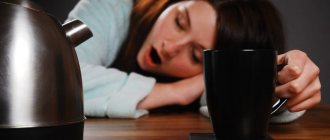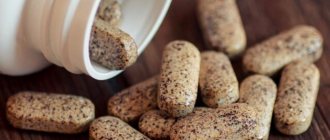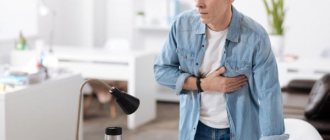The dangers of caffeine overdose
In moderate amounts, coffee benefits the body: it vitalizes, increases brain activity, speeds up metabolism, and tones muscles. In response to caffeine, hormones of vigor (dopamine, adrenaline) and pleasure (serotonin) are produced.
When abused, the effect is diametrically opposite. If you drink a lot of coffee at intervals of 4 hours, the caffeine will have time to partially leave the body. Doctors recommend consuming no more than 150 mg of caffeine per day (1 cup of drink contains about 50 mg of the substance). For black tea, the daily norm is 3-4 cups, for green tea – 4-5. However, the maximum safe dose for most people is 400 mg of caffeine per day.
What happens if you drink a lot of coffee at once? The substance will accumulate in the body, leading to an overdose. If you drink a large amount of the drink once, within 15-30 minutes the first signs of intoxication will appear: heart rhythm disturbances, increased blood pressure, hyperactivity and irritability. This state can last up to 4-6 hours, and the peak occurs 1 hour after consumption.
Systematic abuse of caffeine-containing drinks can lead to various side effects, such as arrhythmia, insomnia, impaired concentration and irritability. Prolonged nausea and migraines may occur. In high concentrations, coffee leads to weakness, muscle tremors and cramps.
Caffeine, when consumed regularly in excessive quantities over a long period of time, can cause serious poisoning. Unlike food, an overdose of coffee has a greater impact on the cardiovascular and nervous system. In case of an overdose, blood pressure increases, there is noise in the ears, and the skin turns red due to the rush of blood. Pulse abnormalities (rapid or irregular heartbeat), pain in the chest, and shortness of breath may occur. As a result, long-term negative effects on the heart can manifest themselves in the form of dangerous diseases: heart attack, arrhythmia, heart failure.
Five cups of coffee protects the liver
The more coffee, the higher the risk of dehydration (Photo: pixabay.com)
If you have liver disease, coffee should be in your diet. Five cups daily protect against pathological processes: the degeneration of hepatitis into cirrhosis, and cirrhosis into cancer. The reason for this is antioxidants, which protect hepatocytes from damage and help liver cells recover. Scientists from the National Cancer Center (Japan) found this out.
Five cups is a caffeine dosage that not everyone can handle. If you drink this amount of drink (or more) every day, there is a high risk that the body will suffer from dehydration. Caffeine activates the kidneys and has a diuretic effect, so for every cup of espresso you need to drink an additional glass of water. That is, another liter of water per day in addition to the usual drinking regime, and this is hardly possible.
Nausea after drinking a drink
If you feel nauseous after drinking coffee, it is impossible to reliably pinpoint the only source of the problem. Typically, this symptom appears for one of the following reasons:
- Beverage abuse . In case of an overdose, nausea from coffee occurs as the body's response to excess toxins. The reason for this reaction is dehydration due to the large expenditure of fluid to eliminate the toxin (that is, nausea is associated with a lack of water).
- Often sick from coffee due to irritation of the gastrointestinal mucosa , when a person is on the verge of an ulcer or gastritis. In this condition, gastric juice irritates the walls of the stomach, which leads to vomiting. This reaction is also noticeable when drinking on an empty stomach.
- In diseases of the cardiovascular system, the symptom may be a consequence of increased blood pressure. Caffeine provokes additional release of adrenaline and dopamine, accelerating the heartbeat and breathing - blood pressure increases, which is accompanied by nausea, dizziness and weakness.
- Another substance whose production is stimulated by caffeine is cartisol, a stress hormone. Anxiety in heavy coffee drinkers can cause nausea.
- Sometimes vomiting after drinking coffee is associated with the body's individual reaction to the substance. Intolerance usually affects pregnant women and women at certain stages of the menstrual cycle.
- In the modern market, it is not uncommon for nausea to be associated with poor product quality . For example, instant coffee consists of 80% chemical additives, and the inscription “100% Arabica” is just an advertising ploy.
- Nausea may be caused by the calorie content of the drink . If it contains nutritional toppings or full-fat milk, the body may react in a similar way.
You can't drink a lot of coffee. How much is it?
If you carefully read this text, you will notice that the normal figure is 1-2 cups of coffee per day. After what number of glasses is it time to sound the alarm?
- 1-2 cups is the norm.
- 4-5 cups is the limit. Systematic use will negatively affect your general condition.
- Above 5 - development of coffee addiction. Detrimental effect on the body.
It is also advisable to follow several rules.
- Don't drink coffee on an empty stomach.
- Secondly, in the afternoon, refrain from drinking a cup of strong drink.
- If for some reason this is not possible, drink coffee with milk to reduce the effects of caffeine.
Have you overdosed on coffee? How did this affect the body? Share your experience in the comments!
Lethal dose of coffee
Children, pregnant women, and people with cardiovascular diseases are at risk of caffeine overdose. Nursing women should use the drink with caution (no more than 200 mg of caffeine per day). For children and adolescents, a daily dose of 3 mg of caffeine per 1 kg of body weight is recommended.
A lethal dose of coffee for a person weighing 70 kg for a single dose corresponds to 10-14 g of caffeine . But to the question “can you die from coffee,” the correct answer is negative, since to do this you will have to drink an unrealistic amount of liquid:
- brewed coffee contains 450 mg/l of caffeine, that is, the lethal dose for humans corresponds to 90 cups (240 g each),
- in an instant drink the concentration is lower: 300-400 mg/l, so you can get poisoned from about 120 mugs,
- for espresso with a high content of the substance (1700-2200 mg/l), the lethal dose is 100-130 cups (45 ml each),
- popular energy drinks contain on average 350 mg/l of the substance, and the lethal volume of the drink is about 120 cans (240 ml each),
- tea, depending on the variety and method of brewing, contains 180-420 mg/l of the substance, so you need to drink from 100 to 230 mugs to worry about the transition to another world,
- natural hot chocolate contains 430 mg/l of the substance, and the lethal dose is 97 cups (240 ml each),
- Cola contains an average of 100 mg/l of caffeine, and drinking 200 bottles at a time (500 ml each) is life-threatening.
What happens if you eat a spoonful of coffee? Drinking a large portion of instant coffee once increases body temperature - this is how the body reacts to concentrated caffeine. If you eat more than one teaspoon of coffee, but 2-3 at a time (without water, just chew and swallow), you can cause a temperature rise of up to 38 °C. The temperature will begin to rise within 20 minutes after consuming the granules, the effect will last no more than 40 minutes.
Fact 1: Coffee can be good for you
No matter what they say about the dangers of this drink, moderation is the key to success, doctors say. A study by American biologists showed that two to three cups a day is more than enough to protect your heart, slightly speed up your metabolism and even dull your appetite - if you have problems with excess weight. In addition, coffee is no less rich in antioxidants than the much-advertised green tea, which means it theoretically protects the body from cancer and slows down aging.
First aid for poisoning, caffeine antidotes
As with any type of food intoxication, if a person has drunk a lot of coffee, then first of all it is necessary to perform a gastric lavage. To do this, the patient should drink 2-3 glasses of water and induce vomiting - this will neutralize toxins that are not absorbed into the blood.
After 30 minutes, you need to take adsorbent drugs, as well as medications that help coat the gastric mucosa. Activated carbon is suitable for this (take 1 tablet per 10 kg of body weight) or the drugs “Smecta”, “Atoxil”, “Sorbex”.
Dehydration caused by caffeine poisoning is combated by giving the patient as much fluid as possible, but in small portions (so as not to induce vomiting again). Frequent urination as a result will allow you to quickly remove toxins from the body.
Be sure to provide the patient with access to fresh air.
When the body functions normally, the symptoms of poisoning go away on their own within 24 hours. If the condition does not improve after treatment measures, you should immediately consult a doctor. The same applies to the symptoms of severe poisoning: cardiac dysfunction, seizures, hallucinations. The patient is sent to the intensive care unit, where the toxicologist will select the exact method to remove caffeine from the body in case of severe poisoning.
specific antidote for caffeine . For treatment, a set of medications is used, as for food poisoning, in addition to which they include droppers, special cardio medications, and medications to lower blood pressure.
Expired coffee: “you can’t throw away the drink”
The expiration date on any product is indicated to determine the shelf life of its quality characteristics. For coffee, expiration of the expiration date always means a loss of taste and aromatic properties, but such a drink will not cause harm. Expired coffee in any form contains much less caffeine, which negates not only the taste and smell, but also its tonic qualities. Depending on the way the product is packaged and the degree of expiration, it can be restored to its lost characteristics.
- Expired green coffee can be consumed. The taste and smell can really be restored by roasting and grinding. Such a drink will not cause harm to the body.
- Roasted coffee beans in sealed or vacuum packaging are not harmful if the expiration date is relatively recent. Then it will lose some of its taste properties. But if the beans have an uncharacteristic greasy sheen, are too dark, and have a rancid smell, the product should be thrown away: it will not be possible to revive it, and you may feel sick from such coffee.
- Ground expired coffee in a closed package may not lose its quality much longer than the indicated expiration date, but the older it gets, the more tasteless the drink made from such coffee will be. An opened pack expires even faster: within a month it loses 90% of its properties.
- Expired instant coffee loses its taste more slowly due to chemical components (flavors, dyes, preservatives, enhancers): an airtight jar can be opened even after 3 years of storage. However, after 2 months the opened product will lose its smell and taste, turning into a “coffee drink”.
Coffee in the morning can really be the key to a good, cheerful day, but you need to know when to stop it. In order not to provoke disturbances in the functioning of the digestive, nervous and cardiovascular systems, you should drink the drink with caution, and then you can get down to business with renewed vigor and without fear for your health.
Interesting video from the KeepLooks Show channel “10 facts about caffeine”:











